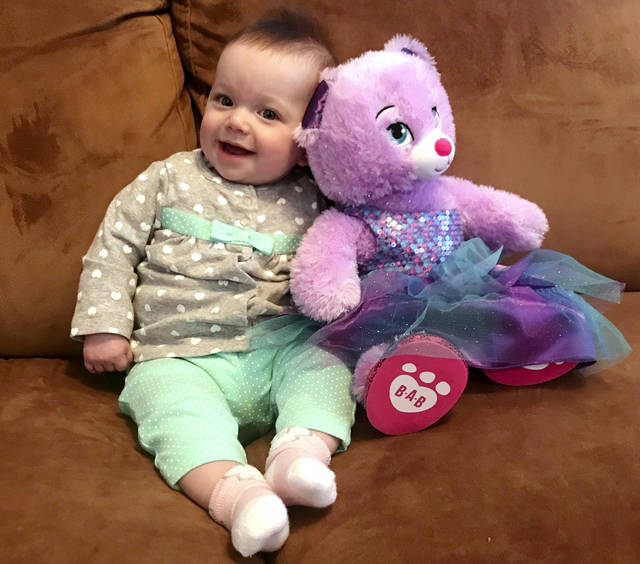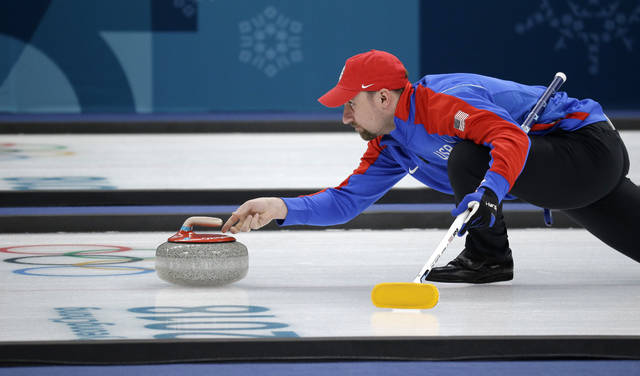GANGNEUNG, South Korea — Long before her frightening birth, before the awful moments when everyone wondered if she would survive, before anyone knew how tough she could be, Ailsa Polo’s destiny was linked to an isle of granite.
Both her parents were curlers, members of a tight-knit sport where an intense reverence for the game tends to bleed over into the players’ personal lives. And so it was only natural that Joe and Kristin Polo decided to name their future daughter Ailsa, after the Scottish island where the granite that makes curling rocks is mined.
The Polos couldn’t have foreseen how fortuitous her name would be.
Today, Joe Polo finds himself in Pyeongchang, competing on the U.S. Olympic curling team in what would normally be the highest-stress moment of an athlete’s life. And yet he is calm. Medal or not, he says, this is just a game. Ailsa was the real achievement.
The story of Ailsa began when the Polos were in high school. They met (they think) at the local curling club in Bemidji, Minnesota, the curling capital of the U.S. Though they were fast friends, they didn’t start dating until college, when Joe mustered up the courage to send Kristin an invite to dinner via AOL Instant Messenger. She accepted, and their bond was sealed.
They married in 2010, but put off having children for a few years because of Joe’s intense curling training schedule. Once they began trying, it took longer than they’d anticipated. So when Joe found out on his birthday in December, 2016, that Kristin was finally pregnant, he was elated.
He was also, understandably, a little freaked out. Still, amid the swirl of unknowns that plague parents-to-be, the Polos were sure of one thing: Their daughter needed a name that paid homage to curling.
Joe thought of Ailsa Craig, a legend in the curling world. The uninhabited island is one of just two places on Earth that produces the granite required to create the 42-pound (19 kilogram) circular stones that curlers send whizzing down the ice.
“Ailsa” had a nice ring to it. Joe pitched it to Kristin. She loved it, and Ailsa’s fate was sealed.
The name was easy. Kristin’s pregnancy was not. After a rough first trimester, things seemed to settle down. And then one day while Joe was at work, his phone rang. It was Kristin. She was in pain, she said, and bleeding.
“I think I need to go to the hospital,” she told him. She was only 24½ weeks pregnant.
Joe raced to the hospital to meet his wife. There, a doctor informed them she was already 7 centimeters dilated. Kristin was given medication to stop her contractions and relegated to bed rest. “Hold on,” the doctors told her.
The warnings were dire. At that stage, the baby would have an 80 percent chance of survival. Even if the infant lived, the risk of health issues was severe.
Every extra hour Kristin could keep the baby inside her womb was crucial. For a week, she barely moved from bed. And then suddenly, the contractions began again.
It was April 29, and Ailsa was coming whether they were ready or not. The doctors hurried Kristin into surgery for an emergency caesarean. Joe, normally cool in a crisis, was frantic. When his daughter finally emerged, he heard her make one squawk. Kristin and Joe began to cry with relief. Their baby, they thought, would be OK.
But Ailsa was just 1 pound, 14 ounces (850 grams). Her torso was the size of an iPhone.
The first time Joe held her was thrilling and terrifying. She felt so fragile.
“You’re picking her up and she weighs nothing,” he remembers now. “You just put her against your chest and go, ‘What am I going to do here?’”
Mae Polo remembers the fear she felt for her first grandchild, and for her son, Joe. Kristin’s wedding ring, she says, could fit over Ailsa’s foot.
“It was very, very scary,” she says now. “I’ve never seen my son so upset in my life.”
The doctors gave Ailsa medication to help her underdeveloped lungs. Then they put her on a respirator, saying it would be necessary for several weeks. Just one day later, Ailsa came off it. She was breathing better than anyone had anticipated.
Again and again, Ailsa defied expectations. Over the next month, she graduated from a ventilator designed for premature babies to the standard version. Unlike most preemies, who often take two steps forward and one step back, Ailsa had virtually no setbacks.
Joe and Kristin spent long days at the hospital talking, reading and singing to their daughter. Every three hours, they were allowed to hold her for around 15 minutes. They helped change her diaper and bathe her — tasks that other parents might dismiss as mundane, but were precious to the Polos, who struggled to leave their baby behind every night. Sometimes they spent the night sleeping on a couch at the hospital.
After 74 days, the doctors gave the Polos the good news: Their daughter was strong enough to go home.
At barely 5 pounds (2.3 kilograms), she was still so small that the car seat swallowed her up. And when they got her home, fresh challenges awaited.
Joe and Kristin had grown accustomed to the beeps and dings of the neonatal unit’s monitoring equipment, a soothing soundtrack that reassured them their daughter’s heart and lungs were still working. Now, silence was their nemesis. At night, they would jump up to check on Ailsa every 15 minutes to make sure she was breathing.
After two weeks, they settled into a rhythm. And Ailsa continued to thrive. Fortified breast milk helped her pack on weight, and she now tips the scales at 16 pounds (7.3 kilograms), which has pleased her doctors.
“They said, ‘She’s the perfect amount of chunky right now,’” Joe says with a laugh.
Kristin went back to work and started graduate school classes. Joe returned to preparing for Pyeongchang, where he and his fellow Olympic curlers are battling for a spot in the semifinals.
But in the end, it was Ailsa’s battle that mattered most.
“It’s definitely given me a new perspective on things, that life isn’t all about curling,” he says. “I’m here, I’m having fun and enjoying it. But win or lose, it’s just a game.”
When his team is out there on the ice, he thinks about his little fighter waiting for him back home in Minnesota, his baby who beat the odds. “She’s tough,” he says. “For sure.”
She is, after all, named for an island of granite.
———
Kristen Gelineau, Australia bureau chief for The Associated Press, is on assignment at the 2018 Pyeongchang Winter Olympics. Follow her on Twitter at KristenGelineau.



